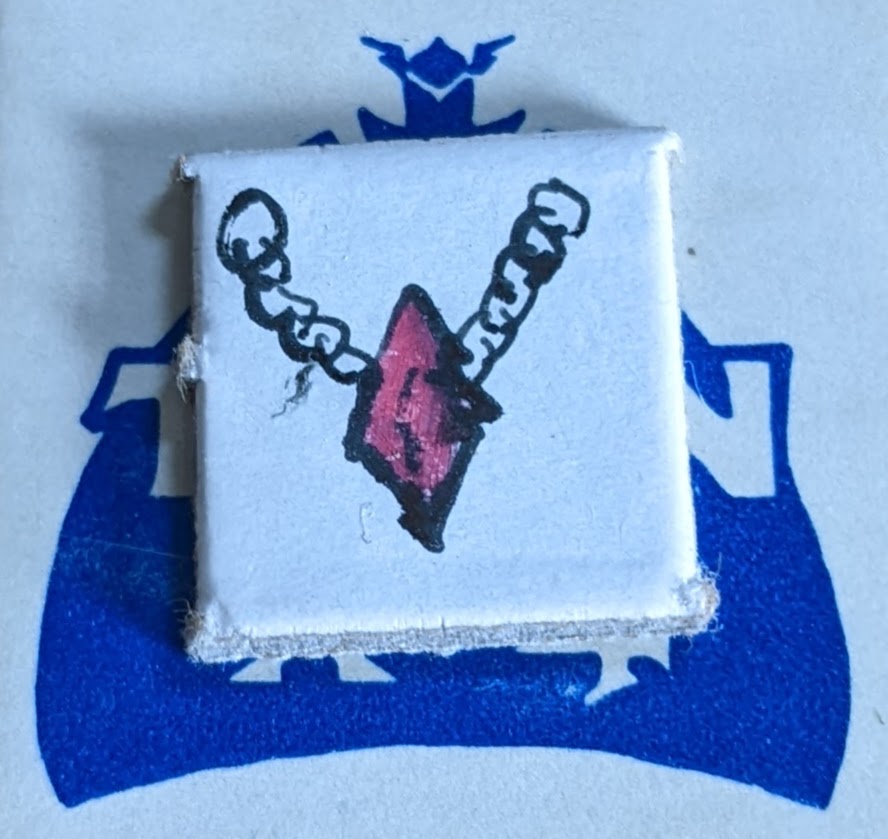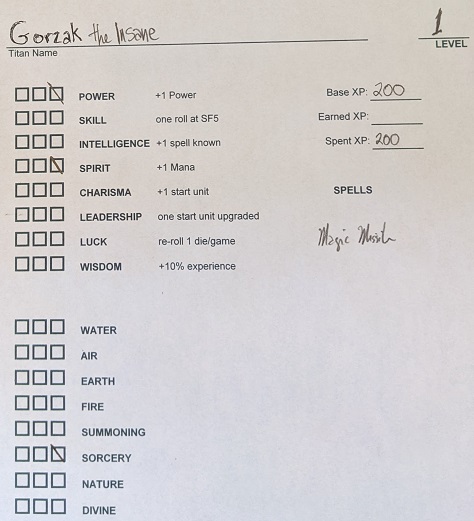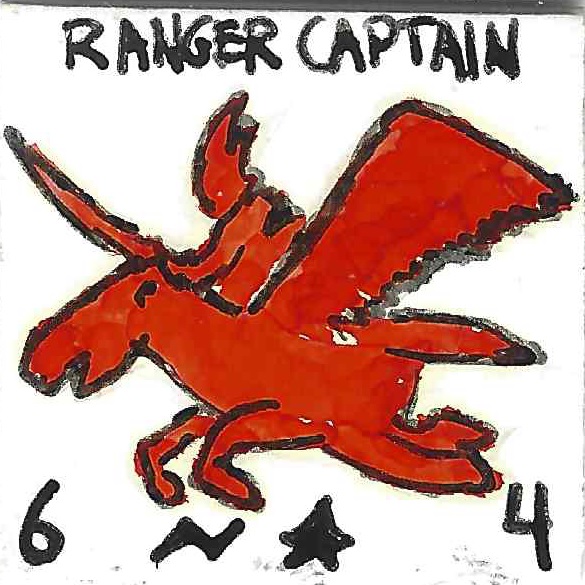Campaign Titan
Campaign Titan came about in the 2000s as a variant where your Titan is treated as an RPG character. The Titan earns experience
and gains abilities which persist from game to game. It was conceived for the original game, because by then I had lost my buddy
who played Tactical Titan with me all the time, and my new players were more interested in the original game. But the rules for
Campaign Titan could be applied to Tactical Titan with some tweaks.
If you play with the original game, you could simply play game after game with normal setup and rules. Alternately, you could apply the
scenarios concept, originally conceived for Tactical Titan,
and come up with a series of ever more challenging scenarios for the Titans to play as they level up.
|
|

|

We played a few games with these rules. I know because I still have some old character sheets. One is pictured to the left.
Looking at the sheet, you might detect some inspiration from
Heroes of Might and Magic III, which I was into around the same time that I created this. The Titans have abilities which
are similar to the Hero Skills from HOMMIII. And like those heroes, the Titans have spells which are grouped into different spell
schools, also similar to the ones from HOMMIII.
For example, Gorzak there knows the spell Magic Missile, which is in the Sorcery school. He also has one level of Power, which gives
him an extra die in combat, and one level of Spirit, which gives him an extra mana (spell point) for casting Magic Missile. As he gains
experience, he can spend it to improve himself further, gaining more abilties and spells.
The sheet pictured here is old and outdated. Since it was printed, the Luck ability was modified to give one re-roll per turn,
not per game. Space was added on the sheet for Titans to track their magic items and gold, as well as their Honor Guard, which
are characters from a game that stay with the Titan and join their starting Legions in the next game.
Campaign Titan was played a bit, but not enough to be considered thoroughly playtested. The spells in particular might not be well
balanced, as we never developed any Titan's to a high enough level to have a lot of spells. But I have gone ahead and cleaned up the
rules and put them here on this page.
The complete new rules are at the link below, or you can download them in PDF format.
Campaign Titan Rules |
Gold - What Is It Good For?
If you actually read the rules, you will see that they mention a place on the Titan character sheet for keeping track of gold, which is used
for purchasing magic items and spells. But no further details are provided. How would a Titan actually gain and spend gold?
For gaining gold, there might be a gold award equal to the experience award at the end of a game (prize award), or one equal to a Titan's
in-game score (bounty award for defeated characters). Alternately, or in addition, there could be gold stashes on the Masterboard; they would basically
work the same as magic items. Any character can carry around any amount of gold.
Counters representing the stashes would need to be used to track the gold, because in a Battle it would be at risk of being taken by the
opposing player. At game end, all gold in all Legions owned by a player transfers to the Titan's character sheet. If a Titan is eliminated,
they still keep half of the gold from their remaining Legions, before those are eliminated.
In between games, Titan's can spend their gold on magic items from the list that was
originally developed for Tactical Titan. The cost of a magic item in gold would be 100x the listed XP value. For example, a Talisman of Healing
would cost 100 gold, while a Crown of Might would cost 300 gold. Magic items could also be sold, but for half price, so that the gold could
be used to acquire different items.
Spell Scrolls
As for purchasing spells, well, that could be done through a new kind of item - a spell scroll. The cost of a scroll would be 100x the level
of the spell. It would amount to an item that was a single use of the spell. Only a Titan and certain Demilords could use a scroll, and using
one would count as casting a spell (so no other spell could be cast on the same Battle-round, for example).
The limitations on casting spells from scrolls are as follows:
| Titan of level 1 or higher |
Any 1st level spell |
| Titan of level 3 or higher |
Any 2nd level spell |
| Titan of level 5 or higher |
Any 3rd level spell |
| Warlock |
Any spell |
| Druid |
Any spell from the Nature or Earth school |
| Healer |
Any spell from the Nature or Divine school |
| Ice Witch |
Any spell from the Water, Air or Sorcery schools |
| Cleric |
Any spell from the Summoning or Divine school |
Other Rules for Gold and Items
Here are some fun ideas for leveraging gold and items in the middle of a game.
A Plains that is adjacent to a Tower contains a Market. When a Legion ends its turn in that Plains (after any Engagement is resolved),
the player can purchase items from the Market for that Legion, using the gold which that Legion's characters are carrying. They could either
get any item from the list, or there could be a specific randomly generated list of what is available in that Market. It could be a different
list for each individual Market (tracked using the number printed on the Land on the Masterboard). Items sold in a Market would be available
for purchase in that same Market in later turns.
Towers contain Banks. Any Legion ending its turn in a Tower (after any Engagement is resolved) can transfer all of the gold it is carrying
to the Titan character sheet. A Titan Legion that is in a Plains containing a Market can spend the gold on the Titan character sheet. However,
it cannot transfer gold acquired by selling items to the character sheet until the next time it ends a turn in a Tower.
The gold on a Titan's character sheet is completely safe and can never be seized by an opponent in battle.
Mercenaries
Mercenaries could be another way to make use of gold in game. Mercenaries are Creatures which are available in a pool set aside from the muster
pile at the start of the game. During a Battle, before their first Maneuver Phase, each player can spend gold to add some of those Creatures to
their Legion. Only gold that is either in the Legion already or on the Titan's character sheet may be spent, and the total number of characters
in the Legion after purchasing Mercenaries can never exceed seven.
The mercenaries then fight like normal characters, except that after the Battle, any which have survived are returned to the Mercenary pool. Use
counters to mark which Creatures are Mercenaries (like a chit with crossed swords drawn on it).
The cost of hiring a Mercenary is 5x the Creature's Point Value. For example, to hire an Ogre would cost 50 gold. Only Creatures
with a Point Value of 25 or less can be Mercenaries. The Creatures which are in the Mercenary pool are not in the muster pile and
cannot be mustered, but once slain join the dead pile and can be raised by a Cleric. Once all Mercenaries in the pool are slain, no more can
be hired.
Here's an example of what might make a good Mercenary pool: 4 Gargoyles, 4 Ogres, 4 Centaurs, 3 Lions, 3 Trolls, 3 Cyclops, 2 Warbears,
2 Minotaurs, 2 Behemoths.
Demilords As Characters
Optionally, the Demilords which can cast spells (see above) could also be treated as characters who gain XP and learn spell schools and spells
like Titans do. Each one should be given a name and an individual character sheet. When a Demilord is mustered, the player doing the
mustering chooses which named character they want added to their Legion, from among the characters who are not already mustered into other Legions.
Rather than starting with the specific abilities listed in the Campaign Titan rules, Demilords start with one 1st level spell, and
must learn any additional spells by earning XP. The exception is that Ice Witches retain their extra die when in a drift hex
as an innate ability.
Demilords start at 0 level, and have a starting spell which
can be cast for 0 Mana, making it like an innate ability. As they level up, they can learn spell schools and additional spells from those schools.
For every odd level they gain, starting with 1st level, they gain a new spell school level from the allowable schools for their Demilord type,
as well as a new spell from the school/level. On even levels, they only gain a new spell from a known spell school level. The rules for gaining new spell school levels and spells are the same as for
Titans, but limited to the allowable schools for the Demilord type. Once a Demilord reaches 1st level, they keep track of their Mana from turn to turn. Each Demilord has 1 Mana/level and is
limited to one spell per Battle-Round, just like a Titan.
| Demilord Type |
Starting spell |
Allowable schools |
| Warlock |
Magic Missile (this is the same as the Warlock's normal rangestrike) |
Any school |
| Druid |
Minor Heal |
Nature and Earth schools |
| Healer |
Minor Heal |
Nature and Divine schools |
| Ice Witch |
Magic Missile with +1 die (this is the same as the Ice Witch's normal rangestrike) |
Water, Air and Sorcery schools |
| Cleric |
Minor Heal |
Summoning and Divine schools |
Since Demilords already have the ability to summon on the Enlistment Phase, then when they learn the various elemental Affinity spells,
or the Summoning spells from the Summoning school, they can cast those spells during the Spell Phase of a Battle-Round. That means they
have a chance of immediately summoning these characters directly into battle! However, this can only be done if the Legion has fewer than seven
characters at the time, and if the Battle is being fought in the appropriate type of Land. Additionally, this summoned creature does not
remain in the Legion at the end of the Battle, instead returning to the muster pile (if it is slain it goes to the dead pile).
Demilords earn XP in mid-game, adding them to their character sheet as the game progresss. Suggested XPs earned by a Demilord:
- For being mustered: 1 XP
- For being in an attacking Legion when the defending Legion flees: 1 XP
- For being in a Legion that survives an Engagement that ends via negotiated agreement: 2 XP
- For being in a Legion that wins a Battle: 3 XP
- For casting a spell: XP equal to the spell's level (no XP for casting their starting spell)
- For still being alive in a Legion that is eliminated when the owning player's Titan is slain: 1 XP
- For being in a Legion owned by a player that wins a game: 2 XP
Demilords are awarded experience during play, and level up in mid-game. They gain a level for every 10 XP. Whichever player is controlling them at the time they level up
decides which spell/spell school they will learn. This happens at game end as well, after final XP are awarded.
Example 1: Fraznak the Warlock earns 10 XP and becomes 1st level. He decides to take a level of Air school and the spell Shocking Grasp (the
player controlling him is deciding this). He now has 1 Mana and can spend it to cast Shocking Grasp during the Spell Phase, or cast Magic
Missile during the Strike Phase for 0 Mana cost.
In a later game, Fraznak earns enough experience to become 2nd level, and the player controlling him decides to have him learn Air Affinity.
This means that for 1 Mana, Fraznak can summon an Air Elemental in Battle on a roll of 10+ on 2 dice, providing that the Battle is being fought
in a Tower or Tundra Land. At game end he earns enough XP to level up again, and learns the 2nd level of Air school and the spell Lightning Bolt. He now has 3 Mana/turn
and a formidable set of spells. Surely he will be in high demand during the next game of the Campaign!
Example 2: Avarra the Cleric starts the Campaign with 0 Mana, and the ability to cast Minor Heal for 0 Mana cost,
even though technically she doesn't know any spell schools. When she gets her first level, the player controlling her decides to give her the
first level of the Divine School and with it the spell Bless.
At her next level up, the player controlling her gives her the spell Protection,
and when she reaches third level, she gains the first level of Summoning school and the spell Summoning I, which lets her summon any creature
between 10 and 20 points in value from the muster pile, with a reasonable chance of success. Avarra now has 3 mana/turn, and can cast the
following spells: Bless, Protection or Summoning I for 1 Mana, Minor Heal for 0 Mana. She is quite the versatile spellcaster!

This page by
Steve Barrera 2022
←The Ranger Captain will take you back to the main Titan page


